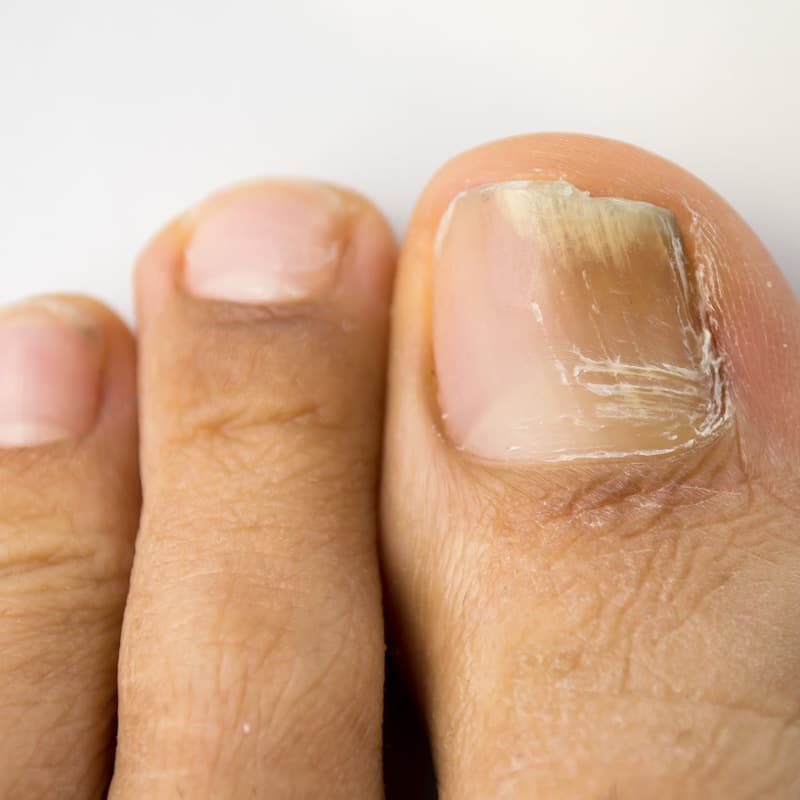NAIL DISEASES & DISORDERS TREATMENT IN Omaha
Fungal and bacterial nail infections, as well as nail disorders such as irregular splitting, or abnormal color or texture, are fairly common. Our fingernails and toenails are constantly exposed, therefore they tend to endure quite a bit of abuse. Poor hygiene, improper diet, genetics, tight shoes, and unsuitable nail filing techniques can all encourage nail issues.
With most common nail conditions, the sooner you initiate treatment, the better—especially when considering that nail abnormalities may help doctors spot underlying conditions. If you notice any changes in color, texture, or sensitivity of your nails, you should consult your dermatologist for evaluation. MOD Dermatology evaluates and treats all of your nail concerns—call today to schedule your appointment and regain healthy fingernails!

COMMON NAIL DISEASES AND NAIL ABNORMALITIES
Did you know the condition of your nails can say a lot about your overall health? More than just a nuisance or cosmetic issue, nail diseases and abnormalities can help doctors detect underlying conditions. Many nail abnormalities are associated with systemic diseases such as hyperthyroidism and anemia. That said, it’s important to seek evaluation early if you notice a change in the health and appearance of your fingernails or toenails.
In addition to treating skin, dermatologists specialize in the treatment of hair and nails. The following are nail conditions commonly treated by your MOD Dermatology providers:
Onychomycosis is a fungal nail infection characterized by patches or white or yellow discoloration, thickening of the nail, separation of the nail from the nail bed, and brittle, crumbly, or ragged nails. Old age, a history of athlete’s foot, walking barefoot in damp communal areas (such as showers and swimming pools), excessive sweating, and having diabetes can all increase your risk of developing onychomycosis or a fungal nail infection.
Psoriasis, an autoimmune disease characterized by abnormal skin plaques, can also impact nails. Common signs of nail psoriasis include nail pits, buildup beneath the nail, nails separating from the nail bed, and nail discoloration. Over time, psoriasis of the nails can worsen and cause permanent nail damage or affect your ability to use your hands and feet.
Lichen planus is an inflammatory skin condition that can also affect the nails. Nail lichen planus is characterized by the thinning, ridging, and splitting of the nail. Without treatment, lichen planus can result in permanent nail loss.
Onycholysis is the separation of the nail from the nail bed. Onycholysis can be a sign of skin disease or infection, but can also be caused by excessive nail filing, chemical exposure, allergic contact dermatitis, and other injuries. Without proper treatment and care during the healing process, onycholysis can result in infections and the permanent loss of the nail.
Paronychia is a bacterial or fungal infection of the tissue around the nail. This nail disease causes inflammation, redness, throbbing, and tenderness of finger or toe tissue around the nail. There are two types of paronychia—acute and chronic—each with different causes and treatment methods.
Onychorrhexis, or brittle nails, is a condition that causes vertical ridges to form on finger or toenails. Onychorrhexis has a wide variety of causes, including trauma to the nail, exposure to chemicals (such as nail polish remover or household cleaners), hypothyroidism, anemia, eating disorders, and more. Sometimes no treatment is needed. However, if your nail abnormality is a symptom of something else, treatment may involve addressing the underlying medical condition.
Sometimes referred to as green nail syndrome, pseudomonas nail infections are caused by the bacteria Pseudomonas aeruginosa. This bacterium is found in wet environments such as hot tubs and sinks. It’s characterized by its green color which causes the green discoloration of infected nails.
WE TREAT NAIL DISEASES AND DISORDERS IN Omaha
Are you in need of nail treatment? MOD Dermatology can evaluate and treat you for the common nail conditions listed above. When you need a dermatologist in Omaha, MOD is the dermatology center for you. Call for an evaluation to discuss your nail concerns today! 402-505-8777




